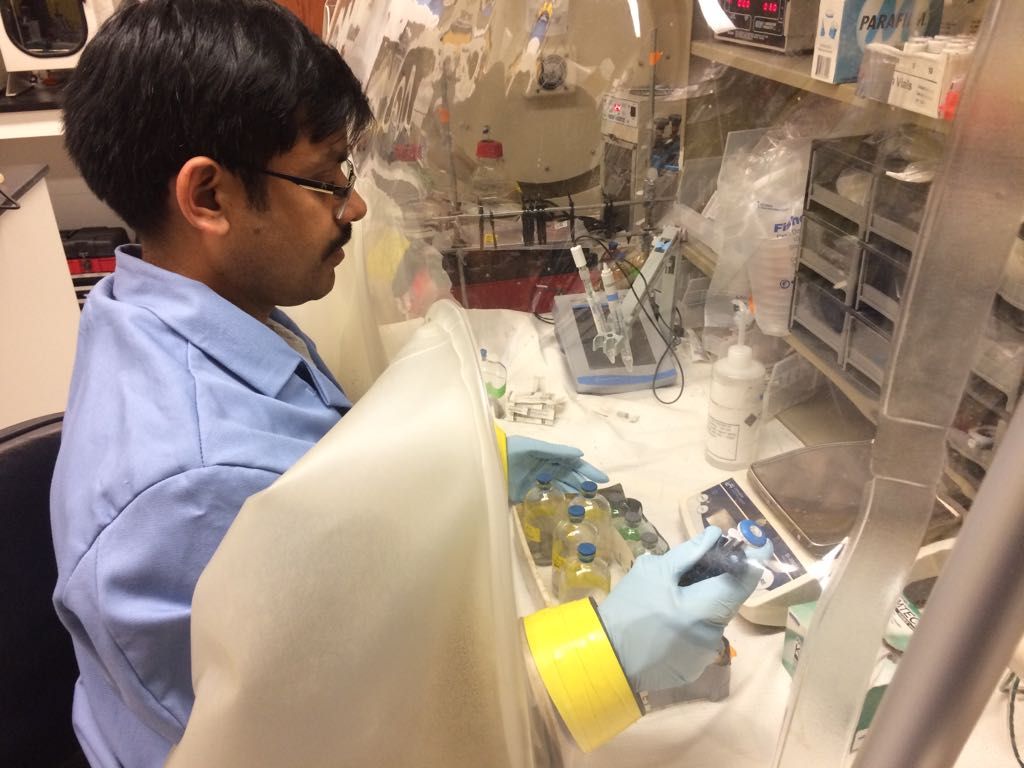
The third wave of Water Advanced Research and Innovation fellowship and internship awards have been announced. WARI is a joint initiative between the University of Nebraska and several of India’s top academic institutions to help build capacity to address global water quality challenges. The 2017-2018 class includes 11 awardees, including one doctoral student from the University of Nebraska–Lincoln.
WARI program partners include the Indian Government and its Department of Science and Technology, the Indo-U.S. Science and Technology Forum, the University of Nebraska–Lincoln and the Robert B. Daugherty Water for Food Global Institute at the University of Nebraska.
Now in its third year, the program provides Indian students and scientists with advanced water research and mentorship opportunities at the University of Nebraska. New this year, WARI is launching a reciprocal exchange component that enables Nebraska students and early-career faculty to conduct water research in India. On Jan. 11, the first Nebraska WARI scholar will begin a five-month fellowship in India that includes stipends for air travel, research and housing.
The first Nebraska WARI scholar is:
• David Gosselin, Ph.D. student, UNL Department of Political Science, for the project: Water Governance and Community Based Organizations. India host: Dr. Ashish Pandey, associate professor, Department of Water Resources Development & Management, Indian Institute of Technology – Roorkee.
Additionally, the 2017-2018 class includes seven doctoral student interns and three early-career research fellows from Indian universities and research laboratories. The 10 awardees will be mentored by Nebraska water science faculty from across the university system, including the University of Nebraska Medical Center’s College of Public Health, the Nebraska Water Center, National Drought Mitigation Center and UNL’s School of Natural Resources, School of Biological Sciences, and Departments of Civil Engineering, Chemistry, and Biological Systems Engineering. WARI scholars will spend three to 12 months in Nebraska after arriving this spring.
The 2017-2018 WARI fellowship awardees include:
- Sandeep Kumar, assistant professor, Guru Jambeshwar University of Science & Technology, Hisar, for the project: Utilization of Nanomaterials for Quick and Efficient Water Management. Nebraska faculty mentors: Ashraf Aly Hassan and Yusong Li, UNL Civil Engineering.
- Raaj Ramsankaran, associate professor, Indian Institute of Technology – Bombay, for the project: Operational Meteorological Drought Monitoring across India using Multi-Satellite High Resolution Grid. Nebraska faculty mentor: Francisco Muñoz-Arriola, UNL Biological Systems Engineering.
- Hiren Dinkarray Raval, scientist, Central Salt & Marine Chemical Research Institute, Bhavnagar, for the project: Exploring the Novel Hybrid Approach for Emerging Contaminants’ Removal for Water Reuse. Nebraska faculty mentors: Dan Snow, Nebraska Water Center; Yusong Li, UNL Civil Engineering.
The 2017-2018 WARI internship awardees include:
- Akarsh A, Ph.D. student, Indian Institute of Technology – Gandhinagar, for the project: Groundwater Vegetation Linkage in India through Remote Sensing and Process Based Modeling. Nebraska faculty mentors: Tsegaye Tadesse and Brian Wardlow, National Drought Mitigation Center.
- Pooja Devi, Ph.D. student, Central Scientific Instruments Organization, Chandigarh, for the project: Development of Biosensor for Non-Conventional Pollutants Determination in Water. Nebraska faculty mentors: Rebecca Lai, UNL Chemistry; Dan Snow, Nebraska Water Center.
- Ipsita Nandi, Ph.D. student, Banaras Hindu University, Varanasi, for the project: Monitoring Water Quality for Turbidity Nutrients and Atrazine using Citizen Science in the U.S. and India. Nebraska faculty mentors: Shannon Bartelt-Hunt, UNL Civil Engineering; Eleanor Rogan, UNMC College of Public Health.
- Banajarani Panda, Ph.D. student, Annamalai University, Chidambaram, for the project: Influence of Vadose Zone on the Geochemistry of Recharging Groundwater. Nebraska faculty mentors: Dan Snow, Nebraska Water Center; Karrie Weber, UNL School of Biological Sciences and Earth and Atmospheric Sciences.
- Veerababu Polisetti, Ph.D. student, Central Salt & Marine Chemical Research Institute, Bhavnagar, for the project: Studies on the Development of High Flux Anti-Fouling Nanofiltration Membranes Application in the Removal of Pesticides and Treatment of Industrial Waste Water. Nebraska faculty mentor: Siamak Nejati, UNL Chemical & Biomolecular Engineering.
- Ashutosh Sharma, Ph.D. student, Indian Institute of Technology – Guwahati, for the project: Analysis and Simulation of Relevant Water Quality Climate Scales using Global Climate Model and Remote Sensing. Nebraska faculty mentor: Francisco Muñoz-Arriola, UNL Biological Systems Engineering.
- Priyanka Uddandarao, Ph.D. student, National Institute of Technology Srinivasanagar Surathkal, Mangalore, for the project: Inactivation of Drug Resistant Bacteria by Employing Biogenic ZnS Nanophotocatalysts. Nebraska faculty mentors: Siamak Nejati, UNL Chemical & Biomolecular Engineering; Xu Li, UNL Civil Engineering.
“We look forward to entering our third year of the WARI program, which is an important part of Nebraska’s efforts to collaborate with India on water quality challenges,” said Chittaranjan Ray, Nebraska Water Center director. “Together, we’re working to equip future leaders with the tools and expertise to tackle water issues that affect our ability to ensure water and food security in Nebraska and around the world.”
The WARI research program addresses shared water quality challenges in the U.S. and India, including the ecological and human health impacts caused by pollutants and contaminants, groundwater quality assessment and management, and remote sensors that monitor and measure water quality. For more information about WARI, click here.
###
The Robert B. Daugherty Water for Food Global Institute at the University of Nebraska was founded in 2010 to address the global challenge of achieving food security with less stress on water resources through improved water management in agricultural and food systems. It is committed to ensuring a water and food secure world while maintaining the use of water for other human and environmental needs.
DWFI is one of four interdisciplinary, university-wide institutes that leverage talent and research-based expertise from across the University of Nebraska system to focus on complex state, national and global challenges. Learn more at waterforfood.nebraska.edu.
More details at: http://waterforfood.nebraska.edu/